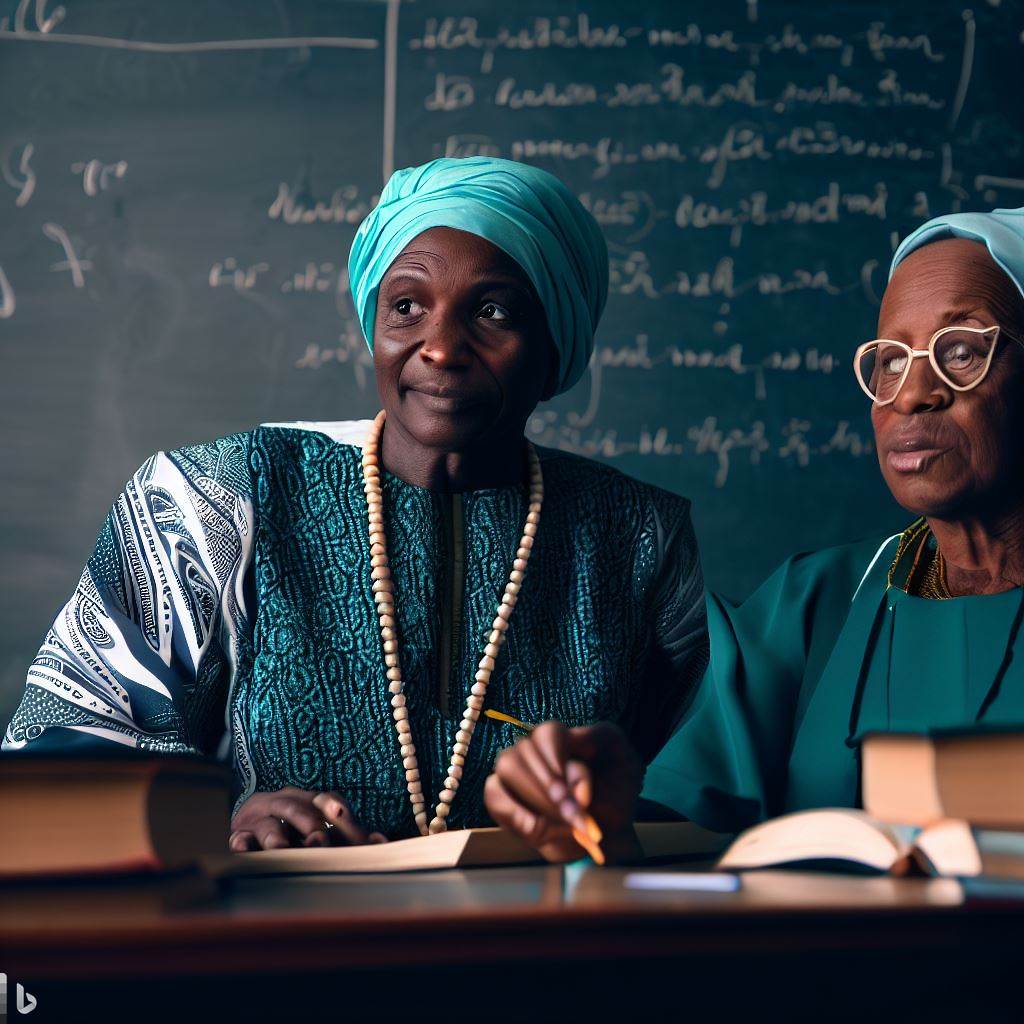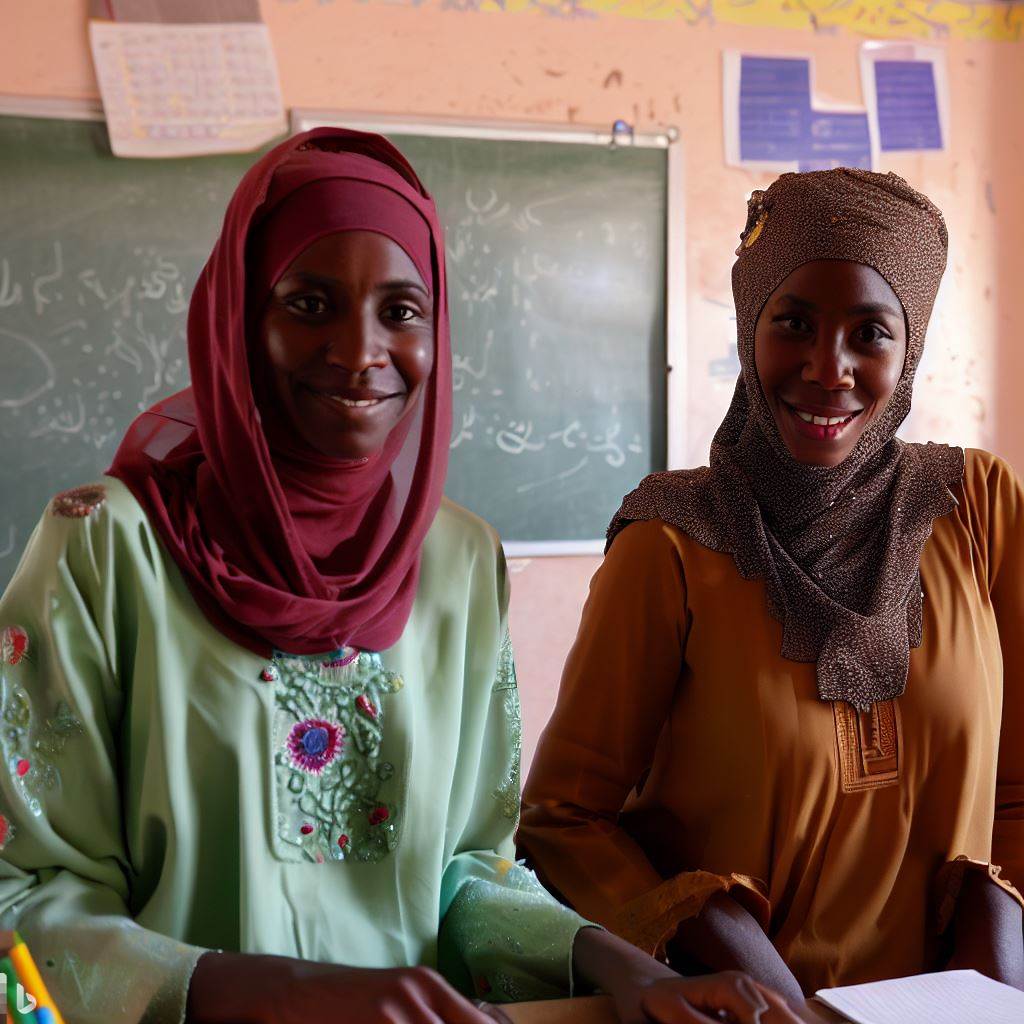Introduction
Definition of inclusive education
Inclusive education refers to the practice of ensuring that all students, regardless of their abilities or disabilities, are educated in a supportive and inclusive environment.
Brief explanation of the importance of inclusive education in Nigeria
Inclusive education is essential in Nigeria as it ensures equal opportunities for all students and promotes diversity, tolerance, and acceptance within the society.
Thesis statement
Teachers play a crucial role in promoting inclusive education in Nigeria
Teachers are at the forefront of implementing inclusive education strategies, creating an inclusive classroom, and supporting students with diverse needs.
Inclusive education is a concept that embraces diversity and ensures that every student, regardless of their differences, receives quality education within a regular classroom setting alongside their peers.
In Nigeria, where diversity is a core aspect of the society, inclusive education is of paramount importance.
It not only promotes social integration but also ensures that every child has equal opportunities to succeed academically and socially.
Teachers in Nigeria hold the key to unlocking the potential of inclusive education. They play a crucial role in creating an inclusive learning environment that welcomes and supports students of all abilities.
By implementing inclusive teaching strategies, such as differentiated instruction and individualized support, teachers can cater to the diverse needs of their students.
Moreover, they foster a sense of belonging and promote positive relationships among students, regardless of their backgrounds.
Furthermore, teachers facilitate the active participation and engagement of students in the learning process.
They can adapt the curriculum to accommodate different learning styles and provide necessary accommodations, such as assistive technology or additional support, to students with disabilities.
In the end, teachers in Nigeria have a significant impact on inclusive education.
Their role involves creating an inclusive classroom, providing individualized support to students, promoting acceptance and diversity, and facilitating a stimulating learning environment for all.
Through their dedication and commitment, teachers ensure that every student has an equal opportunity to learn and thrive, thus contributing to a more inclusive and equitable society.
The Current State of Education in Nigeria
Overview of the education system in Nigeria
- Nigeria’s education system is divided into three levels: basic, secondary, and tertiary.
- Basic education includes six years of primary school and three years of junior secondary school.
- Secondary education consists of three years of senior secondary school.
- Tertiary education is provided by universities, polytechnics, and colleges of education.
- The Federal Ministry of Education is responsible for policy formulation and implementation.
Challenges faced by the education system regarding inclusivity
- Access to quality education is limited for children in rural areas and those living in poverty.
- There is a lack of infrastructure and resources in many schools, making learning difficult.
- The curriculum does not cater to the diverse needs of students, including those with disabilities.
- Teacher training programs often do not adequately address inclusive education practices.
- Discrimination and stigmatization towards students with disabilities persist in schools.
Statistics on the number of children with disabilities not receiving education
- According to the World Bank, about 85% of children with disabilities in Nigeria are out of school.
- This represents a significant barrier to their development and future opportunities.
- Girls with disabilities are particularly disadvantaged and face additional obstacles to education.
- Children with disabilities are at a higher risk of being excluded and marginalized within society.
- Efforts must be made to ensure these children have equal access to education and supportive services.
Read: The Demand for Teachers in Nigeria’s Education Sector
Understanding Inclusive Education
Definition of inclusive education
Inclusive education refers to a teaching approach that encompasses all students, regardless of their abilities or disabilities, in regular classrooms to provide equal access to education.
The benefits of inclusive education for all students
- Opportunity for social interaction and building relationships among students of diverse backgrounds.
- Enhanced understanding and empathy towards individuals with disabilities through real-life experiences.
- Promotion of tolerance, acceptance, and respect for individual differences among students.
- Development of teamwork and collaboration skills as students work together to support each other’s learning.
- Improved academic achievements as students learn from each other’s strengths and overcome challenges together.
- Preparation of all students for the inclusive society they will be a part of in the future.
The benefits of inclusive education extend beyond just students with disabilities.
Inclusive classrooms provide opportunities for social interaction and relationship-building among students from diverse backgrounds.
Interacting with peers of different abilities fosters empathy, understanding, and acceptance. It prepares students to embrace diversity and contribute positively to an inclusive society.
The principles of inclusive education
- Equal opportunity: Every student should have the chance to access and participate in quality education.
- Diversity: Embracing and celebrating the differences that exist among students.
- Involvement: Active engagement of students, parents, and other stakeholders in decision-making processes.
- Individualized support: Catering to the unique learning needs of every student.
- Collaboration: Encouraging cooperation between teachers, parents, and specialists to provide appropriate support.
- Respect and acceptance: Fostering an environment where every individual is valued and treated with dignity.
- High expectations: Believing in the capabilities of every student and setting challenging goals.
- Accessible environment: Ensuring physical, social, and instructional accessibility for all students.
- Continuous professional development: Ensuring teachers have the necessary skills and knowledge to implement inclusive practices.
- Reflective practice: Regularly assessing and adapting teaching strategies to meet the evolving needs of students.
Inclusive education plays a crucial role in fostering an inclusive society. It recognizes that diversity is a strength and promotes equal opportunities for all students, regardless of their abilities or disabilities.
Equal opportunity ensures that every student has access to quality education. By embracing diversity, teachers can celebrate individual differences and encourage a culture of acceptance and respect.
Individualized support is essential in inclusive education. Teachers should identify and cater to the unique learning needs of every student through appropriate accommodations and modifications.
By setting high expectations for all students and providing continuous professional development, teachers can equip themselves with the necessary skills and knowledge to implement inclusive practices effectively.
By empowering students, regardless of their abilities or disabilities, to contribute fully, Nigeria can create a more inclusive and equitable future.
Teachers play a vital role in making this vision a reality by embracing inclusive education and implementing its principles in their classrooms.
Read: An Analysis of Nigeria’s Teacher Shortage Crisis
The Role of Teachers in Promoting Inclusive Education
Inclusive education is a concept that aims to ensure equal access to education for all students, regardless of their abilities, backgrounds, or characteristics.
In Nigeria, teachers play a crucial role in promoting inclusive education and creating a supportive learning environment for all students.
This blog section will discuss the importance of teachers in fostering inclusivity in classrooms.
Creating an inclusive classroom environment
- Providing equal opportunities for all students: Teachers should strive to create a level playing field for all students, regardless of their abilities or challenges.
- Emphasizing respect and acceptance: Teachers should cultivate an atmosphere of respect, acceptance, and appreciation for diversity in their classrooms.
This can be done through classroom rules, discussions, and activities that promote tolerance and understanding.
Adopting inclusive teaching strategies
- Differentiating instruction: Teachers should employ teaching strategies that cater to the diverse learning needs of their students.
This may involve adapting lesson plans, using various instructional materials, and providing additional support or challenges as needed. - Modifying curriculum to meet diverse needs: Teachers should adapt the curriculum to ensure that it is accessible and relevant to all students.
This may include providing alternative assignments, incorporating real-life examples, and using inclusive language and images in instructional materials.
Collaboration with other professionals and stakeholders
- Working with special education teachers and support staff: Teachers should collaborate with special education teachers and support staff to develop appropriate accommodations and interventions for students with disabilities or learning difficulties.
- Engaging with parents, guardians, and the community to promote inclusivity: Teachers should actively involve parents, guardians, and the community in promoting inclusivity.
This can be done through open communication, parent-teacher meetings, and community outreach programs that raise awareness about the importance of inclusive education.
In fact, teachers in Nigeria have a crucial role in promoting inclusive education.
By creating an inclusive classroom environment, adopting inclusive teaching strategies, and collaborating with other professionals and stakeholders, teachers can ensure that all students have equal opportunities to learn and thrive.
It is through their dedication and commitment that inclusive education can become a reality in Nigeria, ultimately fostering a more inclusive and equitable society.
Read: Teacher Training in Nigeria: From College to Classroom

Challenges Faced by Teachers in Implementing Inclusive Education in Nigeria
Lack of resources and training
- Teachers often lack the necessary resources, such as assistive devices and teaching materials, to effectively cater to diverse needs.
- Inadequate training and professional development programs hinder teachers from acquiring inclusive teaching strategies and techniques.
- This lack of resources and training puts teachers at a disadvantage in meeting the individual needs of their students.
Limited support from the education system and government
- The education system in Nigeria does not provide enough support and guidance to teachers in implementing inclusive education.
- Insufficient funding and policies contribute to the lack of necessary accommodations and adaptations in classrooms.
- Teachers often find themselves unsupported and without the necessary tools to ensure the success of inclusive education.
Cultural and societal attitudes towards disabilities
- In Nigerian society, disabilities are often stigmatized, leading to negative attitudes towards students with disabilities.
- Teachers may face resistance and prejudice from their colleagues, parents, and the community when advocating for inclusion.
- Changing these attitudes requires a collective effort and a shift in societal perceptions of disabilities.
Overcrowded classrooms and large student-teacher ratios
- Classrooms in Nigeria are often overcrowded, making it challenging for teachers to provide individualized attention and support.
- Large student-teacher ratios make it difficult for teachers to address the diverse learning needs of all students.
- The high number of students in each class hampers the effective implementation of inclusive education practices.
Teachers in Nigeria face numerous challenges when it comes to implementing inclusive education.
The lack of resources, including assistive devices and teaching materials, hinders their ability to cater to diverse needs.
Inadequate training and professional development programs further impede their ability to acquire inclusive teaching strategies and techniques.
Additionally, they receive limited support from the education system and government, with insufficient funding and policies for necessary accommodations.
Cultural and societal attitudes towards disabilities also play a significant role, as disabilities are often stigmatized in Nigerian society.
This leads to negative attitudes towards students with disabilities and resistance from colleagues, parents, and the community when advocating for inclusion.
Furthermore, overcrowded classrooms and large student-teacher ratios make it challenging for teachers to provide individualized attention and support.
The high number of students in each class prevents the effective implementation of inclusive education practices.
Addressing these challenges requires a collective effort from the education system, government, society, and individual teachers.
Equitable access to resources and training, along with a change in cultural perceptions, will help create a more inclusive educational environment in Nigeria.
By supporting and empowering teachers, inclusive education can become a reality for all students in Nigeria.
Read: The Impact of Teachers on Nigeria’s Development
Strategies to Overcome Challenges and Promote Inclusive Education
Achieving inclusive education in Nigeria requires a comprehensive approach that addresses various challenges.
Teachers play a crucial role in this process, and by implementing the following strategies, they can overcome these challenges and promote inclusive education effectively.
Strengthening teacher training programs
Investing in teacher training programs is essential to equip educators with the necessary skills and knowledge to support students with diverse learning needs.
These programs should focus on inclusive teaching methodologies, differentiated instruction, and classroom management techniques.
Teachers should receive training on identifying and addressing barriers to learning, including disabilities, language barriers, and socio-economic factors.
This will enable them to implement inclusive practices that cater to the individual needs of all students.
Advocating for policy changes and increased funding
Teachers can play a vital role in advocating for policy changes that promote inclusive education.
They should collaborate with education authorities, parent-teacher associations, and other stakeholders to lobby for reforms that ensure equal access to quality education for all students.
Additionally, teachers can advocate for increased funding for inclusive education programs.
This funding can be utilized to improve infrastructure, provide assistive devices and resources, and hire support staff, such as special education teachers or educational psychologists.
Read: Insights into the Teaching Profession in Nigeria Today
Raising awareness and promoting change in societal attitudes
Teachers have the power to influence societal attitudes towards inclusive education.
By actively engaging with communities, organizing awareness campaigns, and conducting workshops, they can challenge negative stereotypes and prejudices surrounding disability and diversity.
Teachers can foster a culture of acceptance and inclusion by encouraging peer support, promoting empathy, and celebrating diversity within the classroom and beyond.
These efforts will contribute to positive societal change and create an environment that values and embraces all learners.
Enhancing collaboration and partnerships among stakeholders
Collaboration among all stakeholders is crucial for the success of inclusive education.
Teachers can initiate and strengthen partnerships with parents, school administrators, community organizations, and NGOs to ensure a collective effort towards inclusion.
Collaborative planning and decision-making allow for the sharing of experiences, knowledge, and resources.
It also promotes a holistic approach to addressing barriers in education, as each stakeholder brings unique perspectives and expertise to the table.
Moreover, teachers can actively involve parents in their child’s education, seeking their input and feedback.
This partnership fosters a supportive home environment that complements inclusive practices within school settings.
In essence, teachers in Nigeria play a pivotal role in promoting inclusive education.
By strengthening teacher training programs, advocating for policy changes, raising awareness, and enhancing collaboration among stakeholders, they can overcome challenges and create an inclusive educational system that benefits all students.
Success Stories and Best Practices in Inclusive Education in Nigeria
Exemplary teachers and their inclusive practices
- Teacher A, a dedicated and passionate educator, implements inclusive practices by adapting curriculum and providing individualized support.
- Teacher B fosters inclusivity by creating a supportive classroom environment where every student feels valued and included.
- Teacher C collaborates with parents and special education professionals to develop inclusive strategies for students with disabilities.
- Teacher D uses different teaching methods and materials to cater to the diverse learning needs of all students.
Successful inclusive education models in schools
- School X implements a co-teaching model, where general education and special education teachers collaborate to support all students in the classroom.
- School Y adopts a resource room model, where students with disabilities receive additional support from special education teachers in a separate setting.
- School Z embraces a whole-school approach to inclusive education, ensuring that all teachers are trained and equipped to meet the needs of diverse learners.
Examining the impact of inclusive education on students’ learning outcomes and social development
Inclusive education has proven to have numerous positive effects on both academic achievements and social growth:
- Improved academic performance: Students with disabilities who receive inclusive education demonstrate enhanced academic outcomes due to individualized support and inclusive teaching practices.
- Enhanced social skills: Inclusive classrooms provide opportunities for students to interact with peers from different backgrounds, fostering empathy, understanding, and tolerance.
- Increased self-esteem and confidence: Being included in the regular classroom environment helps students with disabilities build a sense of belonging and self-worth.
- Promotion of diversity and acceptance: Inclusive education teaches students to appreciate and respect individual differences, promoting a culture of inclusivity in the wider community.
- Preparation for adult life: By learning alongside diverse peers, students develop essential skills for successful future interactions and collaborations in workplaces and communities.
These success stories and best practices in inclusive education in Nigeria highlight the crucial role of teachers in promoting inclusivity and ensuring the academic and social development of all students.
Teachers who embrace inclusive practices and collaborate with parents, special education professionals, and the wider school community create an environment where every student can thrive and reach their full potential.
Conclusion
Recap of the role of teachers in promoting inclusive education
Inclusive education in Nigeria can only be achieved with the active involvement of teachers.
They play a crucial role in creating inclusive classroom environments, adapting teaching methods, and providing support to students with diverse needs.
Call to action for all teachers to embrace inclusive practices in Nigeria
It is essential for all teachers in Nigeria to embrace inclusive practices and take proactive steps to ensure that every student is given equal access to quality education.
This requires a shift in mindset, professional development, and collaboration with other stakeholders.
Final thoughts on the importance of inclusive education for building an inclusive society
Inclusive education goes beyond the classroom; it is a vital step towards building an inclusive society.
By fostering empathy, respect, and understanding among students, inclusive education prepares them to become responsible citizens who value diversity and promote social inclusion.
Teachers have a significant role in promoting inclusive education in Nigeria.
It is crucial for them to embrace inclusive practices, adapt their teaching methods, and provide necessary support to students with diverse needs.
By doing so, they contribute to the creation of an inclusive society where every individual is valued and included.
Let us all join hands in embracing inclusive education and making a difference in the lives of our students and the future of Nigeria.




